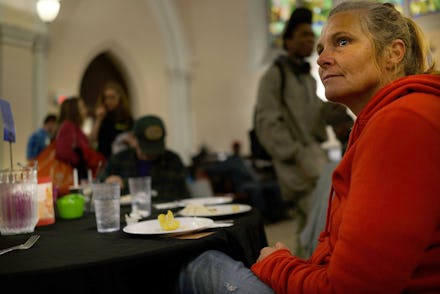Cities Are Criminalizing an Act of Charity Toward the Homeless

The news: In some states, compassion is illegal.
The National Coalition for the Homeless recently issued a report indicating 21 cities in the U.S. have enacted legislation that restricts feeding the homeless. This marks a 47% increase in such laws.
Over 600,000 people suffer from homelessness in the United States. Of those 600,000-plus, 65% are living in emergency shelters. In 2012, a study from the Queen's Nursing Institute discovered the diets of homeless people to be "high in saturated fat and added sugars and low in fiber, vitamins and minerals." This is despite the fact that 70% of the homeless people they spoke to wanted to improve their diet.
Thus, stopping food sharing programs is cutting off a vital lifeline for homeless people and condemning them to the systemic malnutrition that plagues the poor. And it's thanks to a few restrictions that, in practice, seem patently absurd.
How can city governments make charitable acts illegal? These restrictions don't necessarily make "charity" — like local groups such as churches giving out food to homeless people — illegal. Instead, governments are finding ways to make it difficult for food sharing programs to operate legally.
One method is to require food sharing programs to purchase a permit to distribute food. Another is to force homelessness-oriented charities to comply with food safety regulations. In fact, the report claims this can outright stop food from being shared on safety grounds.
To quote the law on Houston's books:
Charitable food services means providing food without charge, payment or other compensation to benefit those in need at an outdoor location not owned, leased or controlled by the individual or organization providing the food.
Houston's food sharing law also states these programs must "coordinated jointly by the director of the health and human services department and one or more community-based organizations."
The distinction is somewhat absurd. You can give five sandwiches to five homeless people, but if you give six sandwiches to six homeless people, you're breaking the law.
But perhaps the most effective method city governments use is mobilizing the population against the food sharing programs.
"In most cases, business and homeowners who do not want people experiencing homelessness to be attracted to their communities, place tremendous pressure, and sometimes even harass, the organization responsible for the food-sharing program to cease or relocate their programs," the report said.
The biggest cities attempting to restrict food sharing include Philadelphia, Denver, Miami, Atlanta, Baltimore, Seattle, Houston and Dallas.
Is this really a big deal though? After all, doesn't welfare toward the homeless incentivize them toward being homeless?
"Street feeding is one of the worst things to do," Robert Marbut told NPR. "It keeps people in homeless status. I think it's very unproductive, very enabling, and it keeps people out of recovery programs."
There's not much hard research to back up Marbut's claims. While people like Marbut are debating the merit of charity toward society's needy, some locales are seeing an increase of homeless people. Homelessness rose in 2013 states between 2007 and 2013. New York saw 8,000 more people succumb to homelessness between 2012 and 2013. California's homeless population increased by just under 6,000.
Officials in states that had lower numbers of homeless people credited their success to the federal "Opening Doors" program, which finds homeless people housing and health care rather than depriving them of food.
The "Opening Doors" program isn't a panacea. A 25-city survey by the U.S. Conference of Mayors in late 2013 contained some harrowing statistics. Over 90% of the cities reported an increase in people requesting food assistance, and 80% of the cities reported more visits to food pantries and emergency kitchens. More than half of the cities involved had to turn needy people away simply because they didn't have the resources.
This means food sharing programs are an essential part of helping America's homeless since the government, despite their best intentions, isn't always capable.
The takeaway: The numbers make it pretty clear food sharing is important in helping the homeless. A few free meals for the homeless won't topple Western civilization. There's no need to criminalize those who are trying to help people with nothing.